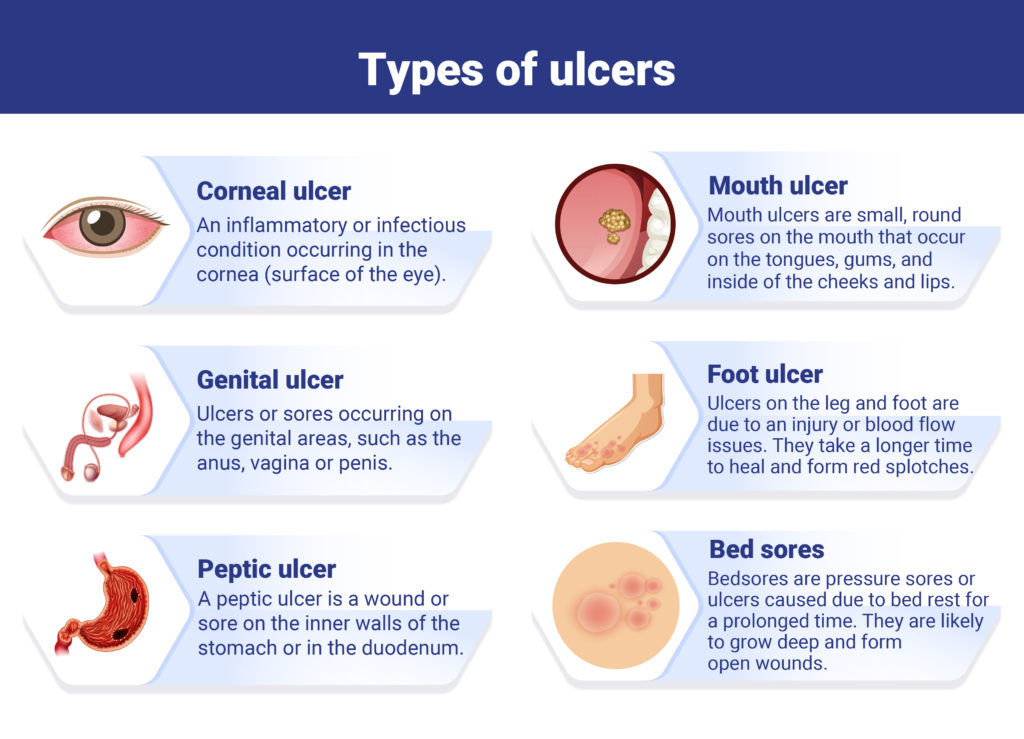
Ulcers are a common health issue that many people have questions about. Understanding the causes, symptoms, and treatments of ulcers can help alleviate concerns and guide those affected toward appropriate care. In this blog, we will address frequently asked questions about ulcers, dispel common misconceptions, and provide resources for further information.
Common Questions About Ulcers
1. What are ulcers?
Ulcers are open sores that can develop on the lining of the stomach, small intestine, or esophagus. The most common types are peptic ulcers, which include gastric and duodenal ulcers. They occur when the protective mucosal layer is damaged, often due to excess stomach acid or infection.
2. What causes ulcers?
The primary causes of ulcers include:
- Helicobacter pylori (H. pylori): A bacteria that can infect the stomach lining, leading to inflammation and ulceration.
- Nonsteroidal Anti-Inflammatory Drugs (NSAIDs): Frequent use of pain relievers like ibuprofen and aspirin can weaken the stomach’s protective lining.
- Stress: While not a direct cause, stress can exacerbate symptoms and may contribute to the ulcer formation process.
- Excessive alcohol consumption: Alcohol can irritate the stomach lining and increase acid production.
3. What are the symptoms of an ulcer?
Common symptoms of ulcers include:
- Burning or gnawing pain in the stomach
- Bloating
- Indigestion
- Nausea or vomiting
- Loss of appetite
- Weight loss
4. How are ulcers diagnosed?
Ulcers can be diagnosed through various methods, including:
- Endoscopy: A procedure where a thin tube with a camera is inserted into the digestive tract to visualize the ulcer.
- Upper GI series: X-ray imaging after ingesting a contrast solution.
- Testing for H. pylori: Blood, breath, or stool tests can determine if this bacteria is present.
5. What are the treatment options for ulcers?
Treatment typically involves:
- Medications: Proton pump inhibitors (PPIs), H2 blockers, and antacids to reduce stomach acid and promote healing.
- Antibiotics: If H. pylori infection is present, antibiotics may be prescribed.
- Lifestyle changes: Avoiding irritants like NSAIDs, alcohol, and smoking, as well as managing stress, can help.
Misconceptions About Ulcers
1. Myth: Stress alone causes ulcers.
While stress can exacerbate symptoms, it is not a direct cause of ulcers. The primary culprits are H. pylori infection and NSAID use.
2. Myth: Only older adults get ulcers.
Ulcers can affect individuals of all ages. Factors such as lifestyle and medication use play a significant role in ulcer development.
3. Myth: You can’t eat spicy foods if you have an ulcer.
While spicy foods may irritate some individuals, they do not directly cause ulcers. Each person’s tolerance can vary, so it’s essential to listen to your body.
4. Myth: Ulcers are always a result of poor diet.
Diet alone does not cause ulcers. While certain foods can aggravate symptoms, the underlying causes are often related to bacteria or medication use.
Resources for Further Information
For more information about ulcers, their causes, treatments, and management, consider the following resources:
- American Gastroenterological Association (AGA): Provides comprehensive information about gastrointestinal health, including ulcers.
- National Institute of Diabetes and Digestive and Kidney Diseases (NIDDK): Offers research-based information on ulcers and digestive health.
- Mayo Clinic: A trusted source for patient education, including symptoms, diagnosis, and treatment options for ulcers.
- Cleveland Clinic: Offers detailed insights into various gastrointestinal conditions, including ulcers.
Conclusion
Understanding ulcers is essential for managing and treating this common health issue. By addressing frequently asked questions and dispelling misconceptions, individuals can take informed steps toward better health. If you suspect you have an ulcer or are experiencing symptoms, consult a healthcare professional for proper diagnosis and treatment. With the right care and information, you can effectively manage ulcers and improve your overall digestive health.

